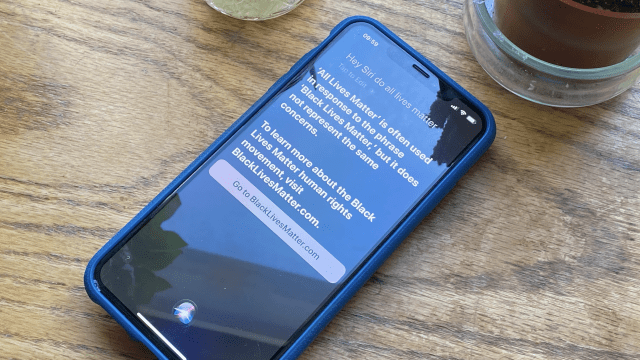While Google, Apple, and Amazon generally do their best to keep their voice assistants apolitical, all three have decided to program answers to the questions “Do Black lives matter?” and “Do all lives matter?” It’s a good thing that all three affirm that Black lives, do in fact, matter. But where Google and Apple’s virtual assistants explicitly shut down the “all lives matter” retort currently beloved by your racist uncle and Karens across the internet, Amazon’s Alexa completely whiffs it.
Over the weekend, sports writer David Gardner posted a video to Twitter of himself asking Google Assistant “Do Black lives matter?” and “Do all lives matter?” In response to the former, Google Assistant responds “Black Lives Matter. Black people deserve the same freedoms afford to everyone in this country, and recognising the injustice they face is the first step toward fixing it.”
“OK, Google: Do black lives matter?” pic.twitter.com/7flByzpmG9
— David Gardner (@byDavidGardner) June 7, 2020
As for whether all lives matter, Google Assistant responds with “Saying ‘Black Lives Matter’ doesn’t mean that all lives don’t. It means Black lives are at risk in ways others are not.”
Users then began questioning other voice assistants in the replies. If you ask Siri if Black lives matter, it responds with a matter-of-fact, “Yes, Black lives matter.” Siri’s response to the question of “Do all lives matter?” is more firm. “‘All Lives Matter’ is often used in response to the phrase ‘Black Lives Matter,’ but it does not represent the same concerns. To learn more about the Black Lives Matter human rights movement, visit BlackLivesMatter.com.”
Amazon’s Alexa also has a pre-programmed response affirming the Black Lives Matter movement. “Black Lives Matter,” it says. “I think people deserve to be treated with fairness, dignity, and respect.” However, Alexa seems more afraid of pissing off folks who ascribe to the “All Lives Matter” school of thought. In responding to “Do all lives matter?”, Alexa gives the same answer — minus the “Black Lives Matter” affirmation.
This isn’t the first time these companies have done something like this. In 2018, Alexa was programmed to declare that it was a feminist. Google Assistant takes a more roundabout approach, noting it is a “believer in equality” so therefore it is a feminist. Conversely, the Guardian also reported that Apple chose to make Siri deflect questions on feminism during the #MeToo movement. Siri’s responses were edited to make sure it would say it was in favour of equality but never mention the word feminism. Even now, if you ask Siri if it’s a feminist, it will give you a spiel about believing in equality for all.
While it’s easy to roll your eyes at this type of PR gimmick, it is worth noting that an increasing number of children grow up with virtual assistants either via a smart speaker or a smartphone. Some teachers are brainstorming ways to bring them into classrooms as a resource. (Whether this is a good idea, is another matter.) Having a definitive, affirmative stance on a moral issue, such as the human rights of Black people, is preferable to a wishy-washy response.
That said, it’s also highly hypocritical of Big Tech to paint itself as an ally when they all have mixed track records when it comes to diversity. Wired found that in the five years from 2014 to 2019, that Big Tech’s efforts to cultivate a more diverse workforce didn’t exactly translate to meaningful gains for Black and Latinx workers.
More specifically, Google, Apple, and Amazon have all had their own cringeworthy moments. In 2017, Apple’s first Vice President of Diversity and Inclusion Denise Young Smith left after just six months, during which she earned some backlash for comments she made at a panel saying “12 white blue-eyed blonde men” could also be considered diverse due to their differing life experiences and perspectives. Some have also criticised Apple for heavily featuring people of colour in their marketing materials while failing to include that same diversity in its boardroom and public-facing keynotes.
Meanwhile, Google has come under fire for letting extremists and racists run rampant on YouTube for years. While it has stated it’s serious about getting rid of hate speech, the platform is would ban Nazis, but you can still easily find white supremacist videos in a simple search.
Amazon’s track record is worst than both Google and Apple. Not only did Alexa have the weakest response to “all lives matter”, but the company also works with the police via its Ring doorbell cameras and Rekognition facial recognition software. Even though experts have said facial recognition tech, including Rekognition, is racially biased, that hasn’t stopped Amazon from trying to hawk it to police departments. (For the record, Rekognition completely flopped a test trial conducted by Orlando police.)
It’s good that all three voice assistants explicitly agree that Black lives matter. But as activists have pointed out across social media, it’s not enough for brands to champion diversity with empty statements and gestures — they have to stop engaging in racist behaviour behind the scenes too.
